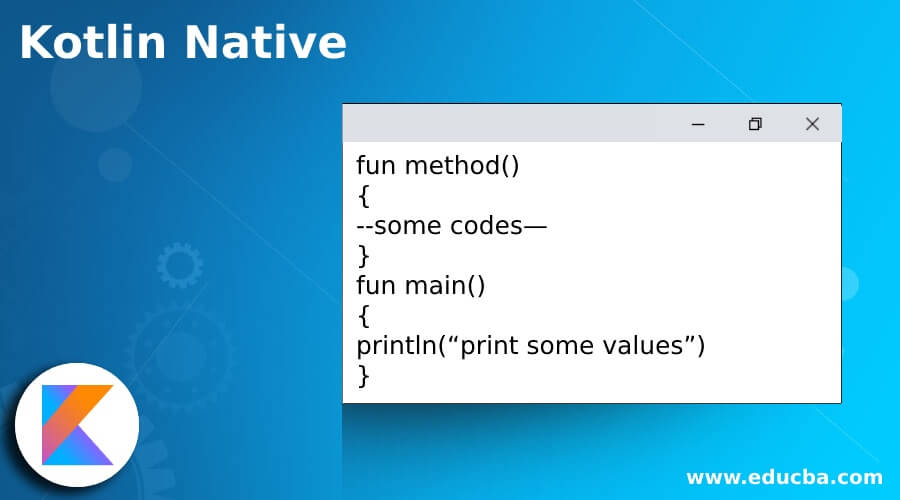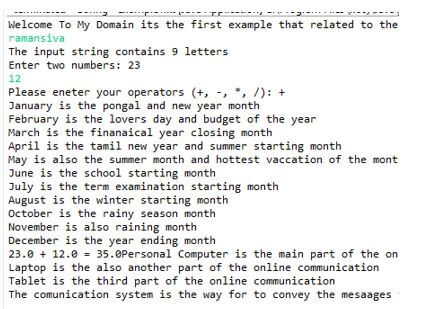Updated April 17, 2023

Introduction to Kotlin Native
Kotlin native is one of the technologies that can be used to compile the kotlin code to native binaries which can be run without using the virtual machine like its an LLVM-based backend for the kotlin compiler and native implementation of the kotlin standard library mainly the kotlin compiler allowed to compile the kotlin platforms for where virtual machines are not desirable or possible machines like embedded or other device platforms like iOS it also beginning to upgrade so that it solves the situations like bug fixing then the developer needs to produce the self-contained programs.
Syntax of Kotlin Native
In kotlin language, it has many default classes, methods and other variables to implement the kotlin application for compiling the native implementation by using the kotlin run-time library. It has its own syntax and rules for applying the native concepts in the application.
fun method()
{
--some codes—
}
fun main()
{
println(“print some values”)
}The above codes are the basic syntax for to write the kotlin language for the application. In that, we can use ide like Intellij ide to use these codes to compile the codes to binary format and displayed it on the console screen.
How does Kotlin Native work?
The kotlin native is one of the primarily designed and it is used to allow the kotlin compiler which helps to compile the kotlin platforms whereas virtual machines are not desirable and it is possible to embed the devices which is similar to the other format devices like iOS, android etc. It is an LLVM based backend for the kotlin compiler and other native implementations of the kotlin standard library.
We used groovy is one of the oldest supported scripting languages to build the tool and the power of dynamic typing and runtime features. Sometimes it can be harder and to maintain the groovy build scripts the primary advantage of the kotlin/native is the GUI sensors, notifications and everything helps that is unique and specified to the GUI, Sensors, notifications and everything that can be unique with each other and specified to each device that will be more developed in the native languages and runtimes without the restriction.
When the Barriers are reduced when it is compared to the other programming languages it helps in the cross-platform programming language in the application development. It focuses on sharing as much as the code is required for the execution when compared to the other cross platform tools.
Examples of Kotlin Native
Given below are the examples mentioned:
Example #1
Code:
import java.util.Scanner
open class firstExample {
open fun methd() {
println("Personal Computer is the main part of the online communication")
println("Laptop is the also another part of the online communication")
println("Tablet is the third part of the online communication")
}
}
abstract class Online : firstExample() {
override abstract fun methd()
}
class Communication: Online(){
override fun methd() {
println("The comunication system is the way for to convey the mesaages from one part to another part")
}
}
fun main() {
println("Welcome To My Domain its the first example that related to the kotlin native concepts:")
val nm = readLine()
nm?.replace(" ", "")?.let {
println("The input string contains ${it.length} letters")
} ?: error("We can read the datas successfully and if the data is null it can't be read.")
val rd = Scanner(System.`in`)
print("Enter two numbers: ")
val first = rd.nextDouble()
val second = rd.nextDouble()
print("Please eneter your operators (+, -, *, /): ")
val op = rd.next()[0]
val outputs: Double
when (op) {
'+' -> outputs = first + second
'-' -> outputs = first - second
'*' -> outputs = first * second
'/' -> outputs = first / second
else -> {
System.out.printf("Your entered operator is invalid")
return
}
}
println("January is the pongal and new year month")
println("February is the lovers day and budget of the year")
println("March is the finanaical year closing month")
println("April is the tamil new year and summer starting month")
println("May is also the summer month and hottest vaccation of the month")
println("June is the school starting month")
println("July is the term examination starting month")
println("August is the winter starting month")
println("October is the rainy season month")
println("November is also raining month")
println("December is the year ending month")
System.out.printf("%.1f %c %.1f = %.1f", first, op, second, outputs)
val lesser = firstExample()
lesser.methd()
val newer = Communication()
newer.methd()
}Output:
Explanation:
- The above example is the basic concept like class, abstract and other child classes are inherited with parent class. This will be used to utilised the native classes and other functions. Here we used some operations like addition, subtraction, multiplication and division for accessing and operated the user datas in the various scenarios.
- Using the while loop to iterate the datas in that it satisfies only the true condition if the input datas are not satisfied it returns the false statement and it exists the loop.
Example #2
Code:
fun main(args: Array<String>){
var p: String = "Welcome To My Domain its the second example that related to the kotlin native concepts"
println("your input value of p is : $p")
var q: String? = "Have a Nice day users please try again"
println("your input value of q is : $q")
q = null
println("After declaring the q value is : $q")
try {
val vars = 41/ 23
println(vars)
}
finally {
println("Your values are printed and exception is showned on the console screen")
}
println("Keep try again")
}Output:
Explanation:
- In the second example, we used two different variables to declare the string types. We have performed the different operations like arithmetic operations for utilising the variable vars.
- Here we used to try, finally block to perform these operations if any of the exceptions are thrown on the try block it will catch using the catch block where we don’t use the catch and finally block always execute.
Conclusion
The kotlin language supports different classes, variables and other functions to implement the application. In kotlin native is one of the features for translating the code to binary format without using the LLVM and the virtual machine even though it supports the multiplatform libraries provide APIs for the kotlin codes.
Recommended Articles
This is a guide to Kotlin Native. Here we discuss the introduction, syntax, and working of native in kotlin along with different examples and code implementation. You may also have a look at the following articles to learn more –



